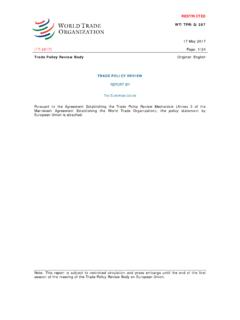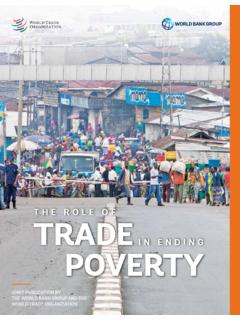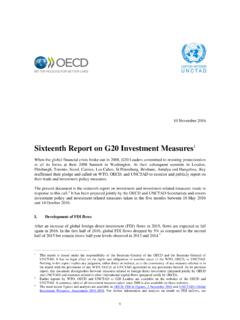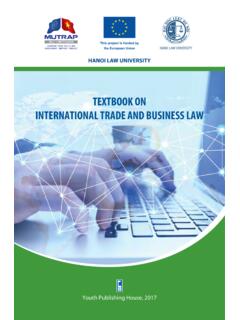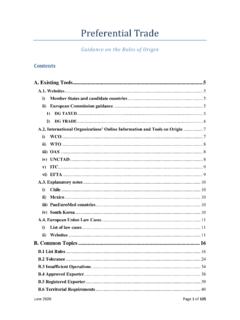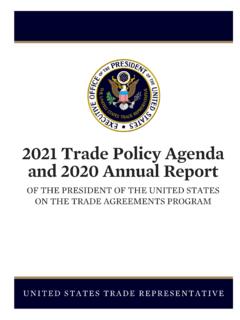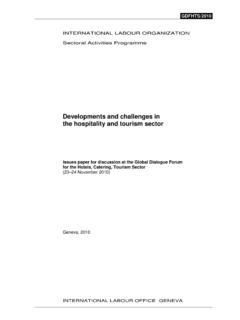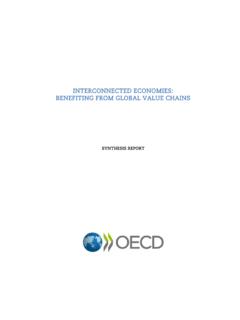Transcription of Original: English THE TRIPS AGREEMENT AND COVID-19
1 15 October 2020. Page: 1/13. Original: English THE TRIPS AGREEMENT AND COVID-19 . INFORMATION NOTE 1. Key points A full response to the COVID-19 crisis requires wide access to an extensive array of medical products and other technologies, ranging from protective equipment to contact tracing software, medicines and diagnostics, as well as vaccines and treatments that are yet to be developed. The way in which the intellectual property (IP) system is designed and how effectively it is put to work can be a significant factor in facilitating access to existing technologies and in supporting the creation, manufacturing and dissemination of new technologies.
2 This is framed by the WTO AGREEMENT on Trade-Related Aspects of Intellectual Property Rights (the TRIPS AGREEMENT ) which represents the most comprehensive multilateral AGREEMENT on IP. Collaboration and cooperation among health technology developers, governments and other stakeholders can be positively supported by the IP system as well as by guidance on lawful cooperation among competitors under a country's domestic competition policy regime. From the beginning of the crisis, governments and stakeholders have considered how innovation is promoted, regulated and managed, including through the IP system, and the contribution that this could make to address the pandemic.
3 A number of initiatives have addressed the voluntary sharing and pooling of IP rights (IPRs), thus responding to the spirit of collaboration that is required for any global effort to tackle the COVID-19 pandemic. Equally, a range of policy options confirmed under the TRIPS AGREEMENT , as implemented in domestic law, remains available to WTO members as tools to deal with public health issues where needed. For example, the TRIPS AGREEMENT allows compulsory licensing and government use of a patent without the authorization of its owner under a number of conditions aimed at protecting the legitimate interests of the patent holder.
4 All WTO members may grant such licences and government-use orders for health technologies, such as medicines, vaccines and diagnostics, as well as any other product or technology needed to address COVID-19 . One member has already issued a government-use licence for a potential treatment. In some other members, the parliament has requested the government to issue compulsory licences to ensure access to medicines, vaccines or diagnostics for COVID-19 and others have updated or clarified their laws in the light of the pandemic. The need for an urgent response to the COVID-19 pandemic has led national and regional IP offices to take initiatives to expedite or simplify their administration of the IP system, especially concerning patents and trademarks, and to provide practical support for firms seeking to develop products of potential benefit in combating the pandemic.
5 Transparency and the availability of up-to-date information is an immediate and critical need that embraces both trade and health-related legal and policy areas. Ensuring maximum transparency of legal and policy measures taken by WTO members in the field of IP to address the pandemic is in the mutual interest of all stakeholders. It supports governments and economic operators to keep up to date in a rapidly evolving trade landscape, provides much-needed clarity and enables mutual learning. Updated lists of IP measures undertaken 1. This document has been prepared under the WTO Secretariat's own responsibility as a factual overview and is without prejudice to the positions of WTO members or to their rights and obligations under the WTO.
6 1. by governments in the context of COVID-19 are available on the WTO's COVID-19 webpage 2. and the WIPO COVID-19 IP Policy Tracker. 3. 1 INTRODUCTION. This note sets out the role and key contributions that the global IP system, including its policy options and flexibilities as implemented in domestic law, can make to address COVID-19 . It also provides an overview of measures taken by WTO members within this framework since the start of the crisis. The WTO's TRIPS AGREEMENT is the most comprehensive multilateral AGREEMENT on IP. It provides for certain basic principles (such as non-discrimination), situates the IP system in terms of promoting innovation and disseminating technology for the public's welfare, sets forth minimum standards of protection in respect of each of the areas of IP covered by the TRIPS AGREEMENT , contains provisions that deal with domestic procedures and remedies for IP enforcement, and makes disputes between members about respect for TRIPS obligations subject to the WTO's dispute settlement procedures.
7 The global IP system provides a framework in which urgently needed innovation in relation to COVID-19 can be encouraged, shared and disseminated. Innovation in health can be seen as a cycle: it covers the stages from initial invention to the supply to the public of a product or service. Within a balanced IP system, the exclusive rights conferred by IPRs can serve as an incentive for investment at each stage of the innovation cycle, and as a mechanism for combining and trading in technology inputs from different sources. Policy choices with respect to the design and implementation of the IP system made at the regional and national levels, along with the management of IP, can also directly influence research and development (R&D) outcomes and access.
8 Article 7 of the TRIPS AGREEMENT describes the objectives of the IP system in terms of a balance of rights and obligations. The objectives refer to the protection and enforcement of IPRs in a manner which contributes to "the promotion of technological innovation", "the transfer and dissemination of technology" to the mutual advantage of both "producers and users of technological knowledge", and also "social and economic welfare". Article 8 states that members may adopt measures necessary to protect public health and nutrition and to promote the public interest in sectors of vital importance to their socio-economic and technological development that are consistent with the provisions of the TRIPS AGREEMENT .
9 The Doha Declaration on the TRIPS AGREEMENT and Public Health, a landmark declaration adopted at the WTO Ministerial Conference in 2001, reaffirmed the objectives and principles of the AGREEMENT as guidance for the implementation of TRIPS provisions in a manner that is responsive to public health objectives. WTO members affirmed that the TRIPS AGREEMENT "can and should be interpreted and implemented in a manner supportive of Members' right to protect public health and, in particular, to promote access to medicines for all". The Doha Declaration also clarified certain policy options, or "flexibilities", within the framework of the TRIPS AGREEMENT .
10 It is thus a well-established principle that the TRIPS AGREEMENT can be interpreted and implemented in line with public health policy objectives and that it provides wide latitude for members to take action to protect public health. While much public health policy attention has focused on the patent system as a key element of the system for innovation and dissemination of medical technologies, other areas of IP covered by the TRIPS AGREEMENT are also significant. 4 Trade secrets and clinical trial data are subject to protection, and the way that this is applied by members can be critical in ensuring that new technologies are carried forward without overly burdening generic followers.




